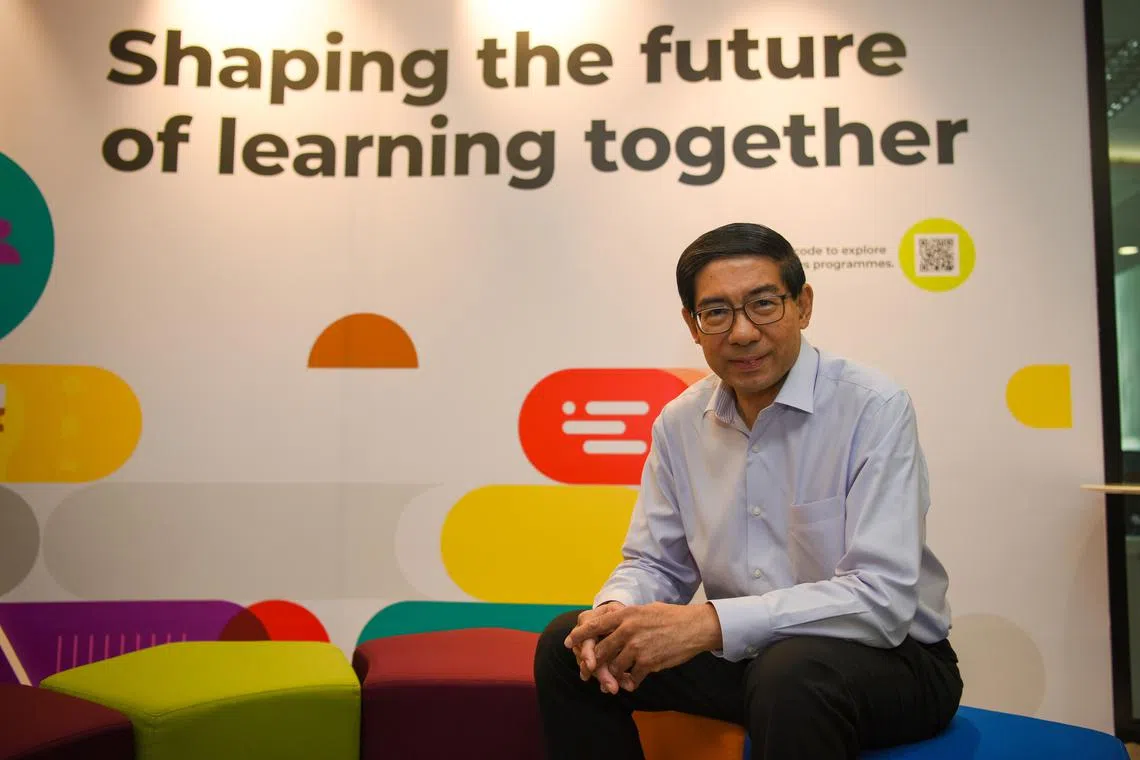The science of training adult educators: Adult learning institute head talks about plans, challenges
Sign up now: Get tips on how to help your child succeed

Mr Yeo Li Pheow has held the position of executive director of the autonomous Institute of Adult Learning since March.
ST PHOTO: EUGENE TAN
SINGAPORE - In the past three months, Mr Yeo Li Pheow has been kept busy at the helm of the Institute for Adult Learning (IAL).
The 63-year-old has held the position of executive director of the autonomous institute of the Singapore University of Social Sciences (SUSS) since March.
He was given the title of associate professor (practice) by SUSS in May, in recognition of his work in the training and adult education sector.
Since late 2022, IAL has been tasked to take on a greater role in adult learning in Singapore, by leading the sector and raising the quality of training.
Adult learning is set to gain momentum, with an estimated half a million learners in the Republic needing upgrading each year, Education Minister Chan Chun Sing has said previously.
The Straits Times spoke to Mr Yeo about his plans.
Q: What does the IAL do?
A: A lot of people misunderstand what IAL stands for. Many people think IAL trains learners, but actually our job is to make sure those who are training adults – and need to transfer their skills – are fully equipped and can do their job.
Q: The IAL has been around for some time. What is going to change from now on?
A: I have plans for different stakeholders, which require different strategies. The first group is the current group of adult educators – IAL has trained about 10,000 of them. Not all are active, but we hope the estimated 1,000 of them who are active will be professional adult educators.
Other groups we are looking at are organisations and unions, institutes of higher learning (IHLs), enterprises, including those which do not have structured learning and development platforms, but need to skill up further.
Another group we need to educate and draw ideas from are Enterprise Singapore, SkillsFuture Singapore and probably the Ministry of Education, and we need to partner with each of them to do research on new fronts.
With the positioning of IAL as the National Centre of Excellence for Adult Learning, we need to do a few things – make sure adult educators are better equipped and that we are thought leaders for research in new andragogies.
Q: What does professionalising adult educators mean?
A: It’s not that someone who comes for training can say he’s an adult educator, just because he’s finished his advanced certificate programme. It’s more than that. There’s a science to it.
We have created tracks for adult educators to professionalise – to be an associate, a specialist and eventually a fellow – so they can upgrade themselves all the time. There are only five Fellows in our system. For every adult educator, we are trying to push them into this space.
To qualify as an associate, individuals need four badges in two skill areas, and specialists need six badges in three skill areas. As at 2022, there were more than 2,600 associates and specialists.
It’s also not just about going to class and teaching; industries are moving very fast, and adult educators need to know the changes in technologies out there.
So under IAL’s Adult Education Network, we have created learning journeys, and brought them around to visit centres of excellence, which are parked within the polytechnics and Institute of Technical Education. This has started with visits to two centres of excellence – one in advanced manufacturing and the other in food nutrition.
We are also making sure educators are more proficient in technology, with new continuing professional development programmes in generative artificial intelligence like ChatGPT. More short courses will be available.
We are trying to promote workplace learning by bringing some modules into organisations, to equip senior guys with the right knowledge and skills to train the junior guys. In particular, I want to help small and medium-sized enterprises (SMEs), a lot of which do not have learning and development. No matter how small you are, as long as you are prepared to commit resources and come into this space, we’ll help you.
Q: How can the IAL help companies in training?
A: We are not experts in discipline, but we can help you put a science to training: to design, formalise and effectively roll out training programmes.
You need to be very clear what your objectives and intent are. You also need to measure outcomes – how do you know at the end of training you have achieved your intent? All this is part and parcel of designing your curriculum for training. There is also the process – how you conduct classes, assessment, workshops or skills-based demonstrations. This varies across industries.
We have had a few success stories, like Shalom Movers, which wanted to change how it trains its movers to be more productive. A team of IAL staff went in to find out how it had been doing its work, how it prepared its workers, and what its supervisors did. We came up with a job redesign and a training programme for them.
Q: What are some of the challenges in workplace training?
A: Currently, most adult educators are English-speaking. We are now trying to target master craftsmen who are non-English-speaking. We are having a big challenge finding adult educators who can train in Mandarin and Malay.
A lot also depends on whether companies believe in training. Smaller companies do have challenges – some ask me why they should send their staff for training when they might join another company. There are opportunity costs for them, but the long-term benefits for them are very clear.
Hopefully by elevating the entire workforce, enterprises benefit from the workforce being better-equipped. And this can be done only with better educators, and that’s where IAL comes in.
Q: What kind of research does the IAL do?
A: We have 92 staff, 30 of whom are in research. One research project that was published in 2022 was on critical core skills.
The study revealed three in-demand critical skills in the Singapore workforce, and serves to inform organisations what they should focus on for their employees. Three critical skills are self-management, influence and creative thinking.
We are currently studying new trends that will impact the workplace, like the use of artificial intelligence. Rapid process automation has taken a big step in innovation and promoting efficiency... If organisations can harness technology like this, workplaces become very efficient and staff can be used to do higher-order things.
We want to promote innovation in education technologies. If you are a company trying to help others to grow their learning and development space, and you have new things you want to experiment with, we’ll help you to innovate and commercialise. If you are an organisation and want to use tools to help you engage learners, we’ll help you test-bed in that space.
Q: How has your experience as principal of Republic Polytechnic for 14 years shaped your perspectives in your new role?
A: I hope to collaborate more with the IHLs. Last year, IAL signed a memorandum of understanding with the polytechnics.
We started by sharing ideas and best practices among adult educators in the polytechnic sector. We hope to facilitate staff exchanges with polytechnics and get them involved in the research we’re doing.
Currently, the IHLs are coming into the continuing education and training space in a very big way – I hope to partner them because they have a lot of discipline capability. For example, Singapore Polytechnic and Ngee Ann Polytechnic have been in this space of training adult educators for many years.
So if I see organisations that need help in developing their manpower, I can then direct them to universities or polytechnics which have strengths in those areas. One example of what we did is connecting SUSS to SMRT. If I can be the bridge there, I think I can do a lot of things for SMEs and even for other organisations.



